Don't wanna be here? Send us removal request.
Text
Nick’s Networking Trek
In a nutshell, this course has been great.
Excellent presenters visited us every week, and each has helped to paint a portrait of what the world of marketing looks like today. Each presenter has offered their own unique perspective on the industry based on their personal experiences and given us insightful advice on how we can move forward with our careers.
Seminar Course Wrap-Up
There are two lessons that I found to be the most important, which echoed across every presentation:
1) All of us should be brave, and we should put ourselves out there.
2) Don’t get discouraged, keep pushing forward and work hard.
As far as pieces of advice go, I wouldn’t say these two lessons are original. That being said, as someone who hasn’t gotten his career of the ground just yet, these lessons can serve as a reminder for me throughout my life.
I have definitely become discouraged in the past, whether it’s working on something for school or personal life events. I’ve tried to not to let it get the best of me over the years, but there’s also one important thing to remember about discouragement: it affects us all. Not even our guest presenters are or were immune to it during their early career days. The difference is that over time they have learned to overcome it and persist. This has led them to their current positions and success.
Brad Furtney
On the topic of success, I must say that my favourite presenter of the semester was Brad Furtney. There were a couple of great takeaways from his presentation:
1) “Learning never stops”
None of us are able to become omnipotent. No matter what age you are or your level of experience, there is no settling when it comes to knowledge. The physicist with a Ph.D. doesn’t just settle on the existing theories of the universe, they work to discover the things we may not know about. It’s important that we keep our minds fresh. New challenges warrant new solutions, and we need to keep learning in order to reach those solutions.
2) The true appearance of success

Success expectations
vs.
Success reality

Brad spoke about how he achieved his personal success - starting up and running his own company. In order to get to that point, Brad worked 14 different occupations, which included 4 career pivots.
That amount of job and career changes sounds exhausting and stressful. However, it is because of all this career detouring and off-roading that Brad was managed to accomplish his goal. If it weren’t for his crazy path, things may have turned out completely different for him.
Success
The point is, success isn’t as clear cut as we’d like it to be. Success looks different for everyone.
I imagine that throughout my life, I too will be bouncing around quite a bit between jobs (maybe careers). However, as long as I can set goals and continue working towards them, I will ultimately be able to reach my own level of success.
Network and Resources
This last semester, I decided to focus more on school and network and quit my part-time weekend job. I feel that working 25-30 hours kept me from focusing on the priorities of school and networking, and I had enough saved up to bite the bullet and quit.
Luckily, I’ve had some success with networking. I’ve had the pleasure of speaking with different content marketing specialists and social media managers, both within Canada and in the U.S. I won’t name them because I don’t want them to get spammed, but they were extremely helpful. They shared with me several marketing tools they commonly use on the job, what their typical day looks like for them, how they deal with clients, the importance of writing good ad copy, and so much more.
Speed Networking
One networking initiative I took was to attend the speed networking event at GB a couple of months ago. When I was there, I made some solid connections with other GB students and with many of the guest ‘mentors.’ Many of these mentors knew the feeling of uncertainty back when they started job hunting and it was nice to speak with people who could so easily relate to my current situation. I have connected with several of them on Linkedin and Twitter and I intend to reach out once I have established what direction of marketing I want to take.
Resources
In terms of resources, Linkedin Job Search has been so helpful for me. There are frequent job postings for digital marketing that I always have a look at, and I’ve even sent out some applications. I’ve spent a lot of time looking over the ‘job qualifications’ section of Linkedin job postings. What I did and continue to do is cross-reference similar qualifications such as “knowledge of HTML/CSS,” “proficient with Google Analytics and Google Ads,” and made note of what I should learn on my free time.
Though this program does a great job of teaching many of those skills, I wanted to take it a step further and build up my resumé and Linkedin profile with completed online courses and certifications, all in an effort to make myself more of an asset.
Networking Lessons
I’ve learned several good lessons about networking over the course of this program. I’ll share a couple of them here:
1) Informational interviews on the phone. If you are conducting an informational interview over the phone, have your laptop or your notepad in front of you so you can write down important points during the conversation.
2) Treat your network contacts with kindness. Be gracious that they are taking the time to speak with you and try to stay in touch with them. You could engage with some of their Linkedin content or even congratulate them on a new position; just letting them know that you care and are present goes a long way.
3) Listen to what your contacts are sharing with you. Whether you meet with them over the phone or in-person, be attentive. Be an active listener and actually pay attention to the conversational flow as opposed to just asking the questions you may have written down. Making it feel more natural creates a stronger connection and shows them you’re engaged.
Thank you for reading, it’s been a pleasure. Cheers.
0 notes
Text
Hold My Beer. I Need a Career.
Forgive me, I'm a sucker for stupid rhymes.
I normally really don't enjoy bringing attention to myself, but for my first blog post, I wanted to, well....bring attention to myself.
Specifically, I wanted to write about my interest in beer. You might be wondering, "yea, who isn't interest in a beer right now?", or just straight up, "how is that even an interest?"
Well, over the last couple years I've spent time reading books, watching videos, visiting places, speaking with experts, all about beer. It’s something I've appreciated learning more about and I wanted to discuss how this interest has brought me to where I am today. This is an exercise in reflection for me. For you, there are some insights about me as well as some decent photos of beer!
I'll be examining how my beer interest came about and how I threw myself into it. I'll also talk about how I hoped to take this interest and turn it into something of a career. Finally, some thoughts about where my head is now and how my goals may have altered, but not eliminated something that I really enjoy.
Also just FYI, it's been really f**king hot outside. Let this post be a reminder to cool off with a delicious, cold pint. *insert wink face*
Beer Beginnings
It was September of 2016, I was a line cook at Jack Astor’s and I just got moved up to becoming a server. Moving from a line cook position to serving was a lot to take in all at once: learning the steps of good service, carrying three full plates at a time (took a lot of trial and error, and hungry irritated guests), and learning all of the different specialty drinks and beers.
At that time, Jack Astor's had over 20 draught taps and already I was wondering, "how on Earth am I going to remember all of these?" As luck would have it, the restaurant decided to add an additional 20 taps to their repertoire, which made me double down with, "Seriously, how on EARTH am I going to remember all of these??"
Memorizing the names of all the beers was one thing, but retaining every beer's style, flavour profile, aroma, and attitude (I’m kidding, that's not a thing) were daunting to me. My solution: I had to learn about beer!
Back then, I was only drinking classics like Canadian or Budweiser; if it were hot enough I'd even go for a Kronenbourg Blanc or a Shock Top, but for me, that was a bit of a rarity. Hell, I honestly didn't even know that beer was broken up into two categories: ales and lagers, maybe YOU didn't even know that!
So to tackle this problem of mine, I took the time to watch several beer videos and look at beer infographics. Once I felt I knew about enough about the foundations of beer, I went back to the Astor's 40+ draught beer menu and guess what - it took WAY less time than I'd thought to remember all of the beers!
My work was done; I knew all 40+ beer taps and their styles, and I could even somewhat comfortably talk about the beers’ tastes to guests (with a pinch of BS). However, the more I spoke about beer at work and after reflecting on the beer learning I had done, I had the realization that I genuinely LOVED learning about beer. That whole process for me was actually kind of a blast.
While writing this part I've thought about a time before this where I had a blissful learning experience, and I completely blanked. That was very telling to me. So, I figured I should commit myself to learn more about beer.
To get started, I ordered the mother of all beer books from Amazon, "The Oxford Companion to Beer." Given the size and scale of it, I prefer to call it The Holy Beerble:
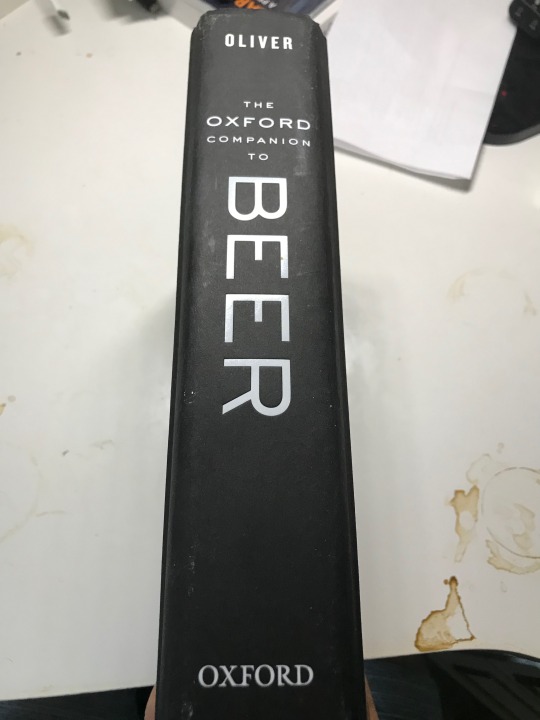
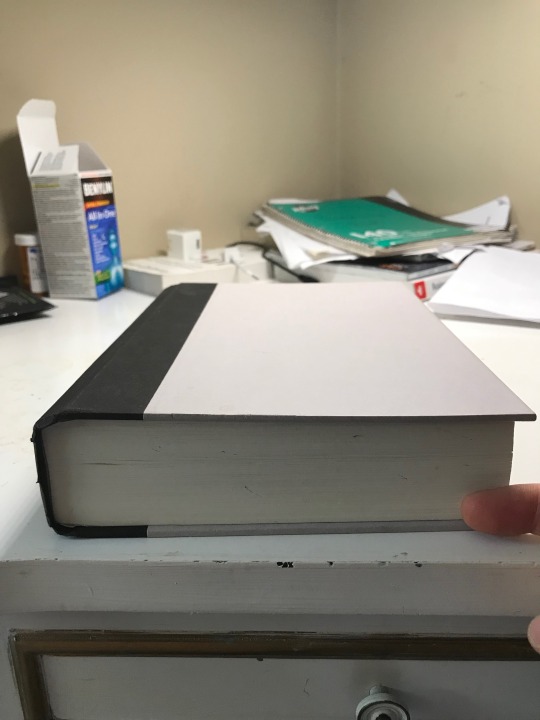
P.S. I am aware I don't keep a very neat workspace, coffee stains and all.
Over 800 pages of diligent research on almost every single thing about beer that you could imagine. Beer countries? No problem. Beer styles? Yup. Beer history? Child's play. That one famous beer guy who did that one famous beer thing? It’s in there. This encyclopedia was amazing. The sheer amount of research done to create this is absolutely astounding. Even today, I will read through it and continue to make notes. I even ordered a couple more books on beer:
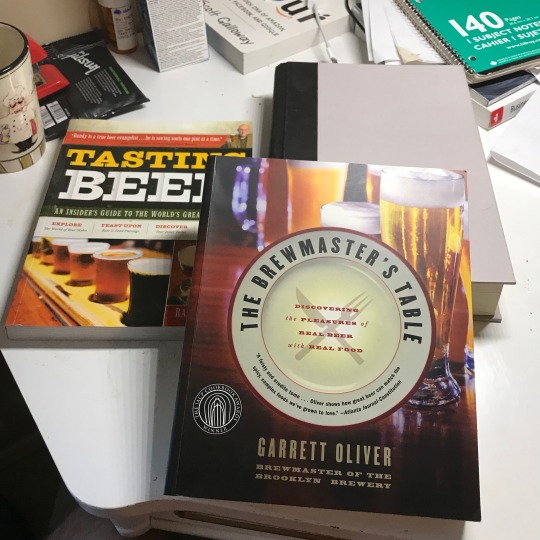
This was fun for me. I didn't mind taking the time to learn more about something I ACTUALLY liked.
Committing to the 'Craft'
Work at Astor’s was slowing down going into the winter of 2017. By then, I would casually read beer articles online or look through some of my beer books. Beer is a fun subject to learn about and share with others. That said, I felt that it was time I should try making my own beer! I knew a solid amount about the beer-making process already i.e. the mash, the boil, fermentation, bottling, etc., and I felt I should apply what I know to make something of my own. Maybe I could impress friends and family, save money on buying beer from the LCBO or The Beer Store, and it would add another layer to this new hobby of mine.
I figured a brewing kit would be my next subsequent Christmas gift to myself, so what I did was start simple: a 1-gallon starter kit, 10 empty beer bottles, bottle caps, bottle capper, other miscellaneous brewing equipment, and some 2-row barley and Cascade hops.

Homebrewing and commercial brewing are different behemoths, and I knew more about the commercial brewing process. That wasn't really going to help me here because I didn't have 50+ hectolitre tank to brew beer in, so I had to watch a few YouTube instructional home brewing videos to get in the right mindset.
I was eager to brew my first batch: a SMaSH (Single Malt and Single Hop) pale ale. A super simple recipe to start with that would ideally lead to a nice tasting beer. For those who don't know, brewing beer require ALOT of both patience and (ugh) cleaning. Literally, I spent over half of my time brewing just cleaning all of the equipment again and again. Any sort of impurity, big or small, is enough to completely ruin a batch of beer. I already respected brewing as an art form, but I learned more about how difficult it really is to make delicious beer that adheres to a certain style. After a 6-hour brew day plus a few weeks of fermentation, this was the result:
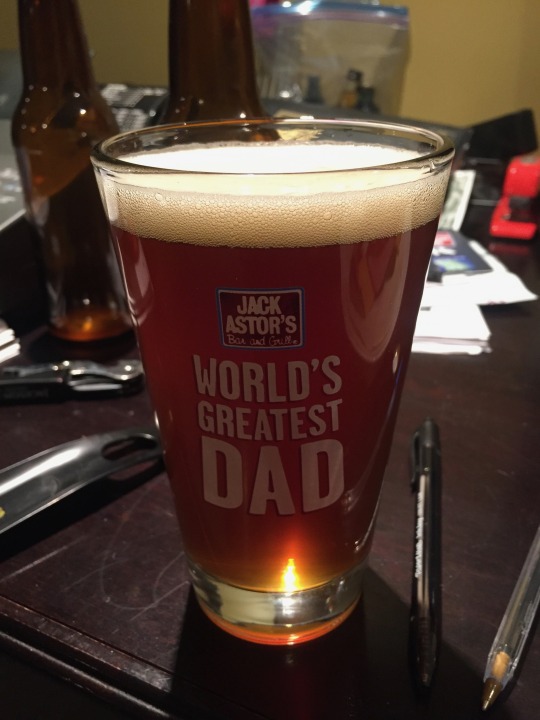
Aesthetically, it's a nice looking SMaSH beer, right?! But the taste....let's just say the taste did not match the look. This was a very important lesson in detecting off-flavours in a beer. There was plenty of them.
I didn't get discouraged; I crafted a chocolate maple porter that tasted pretty solid as well as a decent red ale. Despite my improvements with small batches of beer, I really had a difficult time seeing myself get too serious about it. For one thing, I didn’t always have enough room to fit 10-12 bottles of beer in my fridge. Imagine I start making 5-gallon batches that can yield over 50 bottles of beer, where the hell would I put all that? And if I ruined the batch? That’s a hell of a lot of waste. So, I decided I’d stick with learning and not doing.
YouTube videos and books are great and all, but it's helpful to have a more hands-on learning experience. Enter Prud'homme - a Canadian beer education program with 4 levels of certifications, the top one being "Level 4 - Beer Sommelier."
Prud'homme Level 1 was a lot of fun, and while I knew the lion's share of introductory beer knowledge, the class gave me, even more, to think about. It was a group of 10 in my class (including myself), and each class we were given different styles of beer to try. Up until then, I never really kept any actual notes of the beers I've had, but in class, we would dissect a beer's taste, mouthfeel, finish, colour, clarity, and additional info.
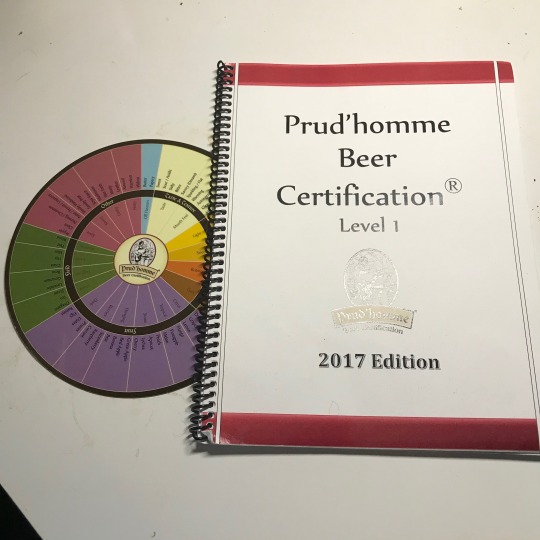
The longer I was in the class, the more I realized that I preferred talking about a beer's characteristics over brewing the beer myself. I'd bought and read all these beer books, I've experimented with brewing, and now I've worked towards my Level 1 Beer Enthusiast certification; clearly, there's something here for me to dive into. I'd been out of school for over a year by that point, and here was this interest of mine that I'd spent time on.
I thought to myself that I should take this more seriously and try to shape this newfound passion of mine into the beginnings of a career.
The Pursuit of Hoppiness
That nugget of internal thinking actually helped influence my decision to apply for a postgraduate degree. Before this, I'd been glancing at different school programs in London, Waterloo, Toronto, etc., but it was mostly looking at programs that might complement my Criminology degree i.e. social work.
If I'd taken this strongly to learning about beer, how can I apply that interest and start a career? I did some thinking over a couple of weeks and ultimately, I decided that getting into marketing could be an excellent opportunity to pursue my interest. Not to mention that marketing is a very versatile degree that would open a lot of doors for me.
I liked the idea of being able to help out the little guy (small-scale craft/micro-brewers) over becoming a cog in the wheel of the bigger beer corporations. Ultimately, I found my way to the George Brown College Digital Media Marketing program web page. It checked off a lot of points on my program criteria list: 1-year in length, a good distance from London, learning all about digital tools used in the workplace, and a semester of work experience!
Getting Forked
Now that I'd made a decision to pursue marketing that could lead to a gig marketing beer, I figured I should find some REAL work experience of being in a brewery.
First and foremost was trying to get a job at Forked River Brewing Company. By then I had met and developed a solid rapport with a few of their staff, and eventually, it led to me landing a job there!
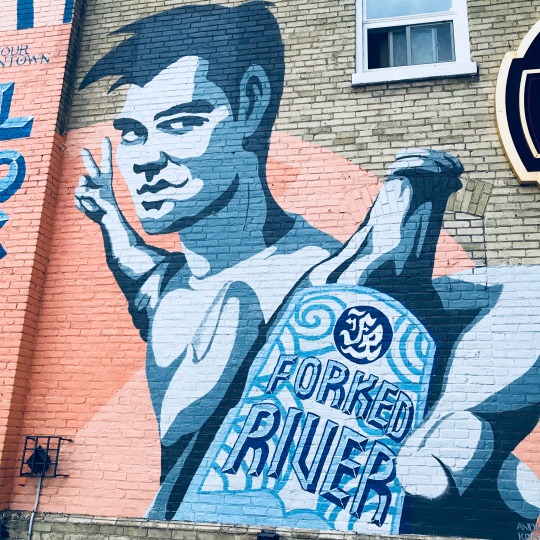
In mid-March, I was hired to help in different areas around the brewery. Sometimes the bosses needed me to work retail or within the brewery, it really depended on the demand of that week. My main goal was to get a very clear idea of how a brewery operates and about their approach to marketing.
On the retail side, I would talk with customers about the beer, sharing with them all of the traits of the beers. There were also other run-of-the-mill retail tasks like handling the cash register, stocking the shelves, or just making sure that people don't steal any beer.
During my time in the brewery itself, I would mostly help the brewmasters with canning (so. many. f***ing cans.) and filling up kegs, but I was also given a chance to help with the actual brewing. I'd go in twice a week early in the morning and work for about 5-6 hours. What I enjoyed the most was the very relaxed atmosphere compared to my time at Astor's. Both were fun, but for entirely different reasons.
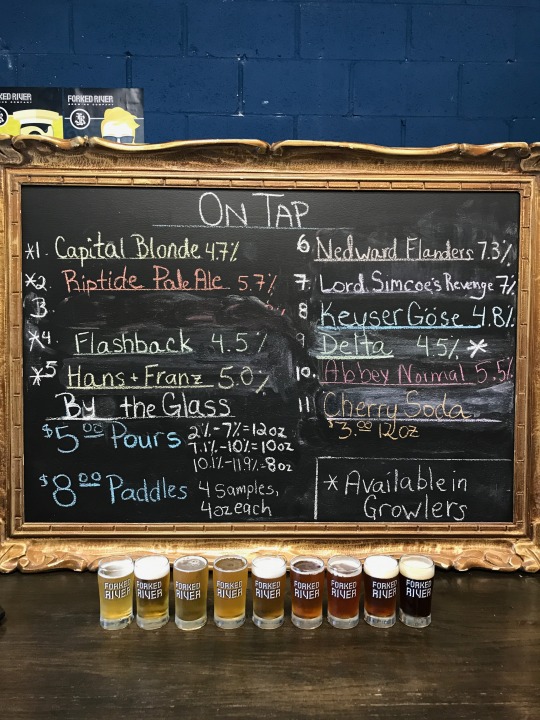
I was even given a chance to work a couple of beer festivals around London and in Sarnia. Those days were the most fun because I could speak about the beers with confidence and encourage festival-goers to try our stuff. Overall, I had a great time over at Forked River and I am grateful to have had that opportunity.
George Brown Ale
Before I knew it, September came along and I was starting my program at George Brown. It felt weird to be back in school but I was excited to be taking this step towards a new career. In order to keep my mind fresh on everything beer, I got a job as a bartender at Biermarkt Don Mills; they've got 150+ beers including draught and bottles. Weekends were my game, closing bar Friday through Sunday (goooood times). They were kind enough to give me another beer book that doubled as an employee handbook:
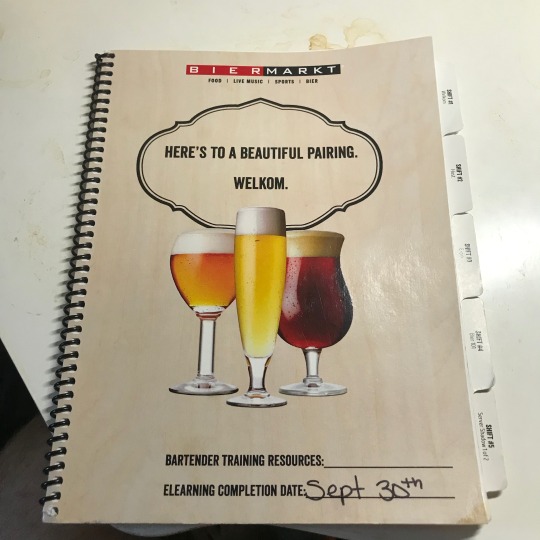
This new program was looking to be a great fit. It's worth noting though that I had spent a lot of my internship search on breweries or beer distribution companies. I wasn't having much luck with that until the next best thing came along - My Wine Canada, a wine/spirits marketing and sales company right down the street from my school building.
Was it beer? Nope. But it's the next best thing.
And also, wine's pretty great! The role itself was "Digital Marketing Manager", very expensive-sounding, right?
What enticed me about it was this internship would give me as close a perspective of what it's like to handle the marketing for beer as I could get. I was setting up social media content calendars, editing and creating photo content, writing wine blogs, drafting weekly emails, and coming up with catchy and funny captions.
Seeing the Bigger Pitcher
The funny thing is, after spending four months with My Wine Canada, I wasn't as certain about wanting to find a marketing job related to beer. Oddly enough, I spent so much time obsessing about finding a job just like it, that I forgot to really sink my teeth into marketing. I was surprised to find that I really liked learning about marketing. Made me reflect (again) on what I was doing.
In my final semester, I've wondered about whether or not my priorities were as straight as they should have been. For most of this program, I've been so narrowly focused on finding a marketing job involving craft beer that I may have completely missed other great opportunities. I don't want that to happen going forward, so I'm taking that into account and keeping an open mind without losing sight of why I got into this program in the first place. Beer is a hobby that's going to stick around in my life and because of it, I have gotten involved in great things and introduced me to some amazing people, and I wouldn't trade that away.
1 note
·
View note